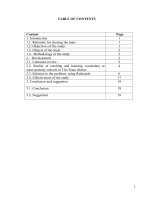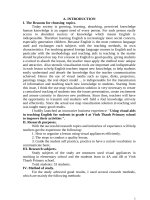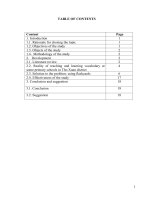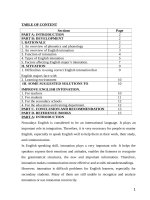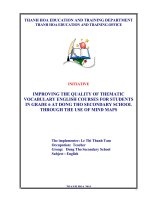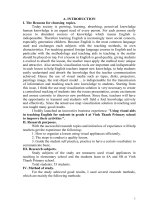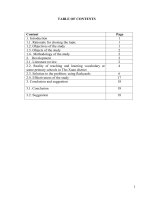Apply some games to check english vocabulary in grade 3 at dong hoa primary and secondary school
Bạn đang xem bản rút gọn của tài liệu. Xem và tải ngay bản đầy đủ của tài liệu tại đây (1.2 MB, 21 trang )
DEPARTMENT OF EDUCATION AND TRAINING THANH HOA
DONG SON EDUCATION AND TRAINING CENTER
EXPERIENCE INITIATIVE
APPLY SOME GAMES TO CHECK ENGLISH VOCABULARY
IN GRADE 3 AT DONG HOA PRIMARY
AND SECONDARY SCHOOL.
Teacher : Mai Thi Thao
School : Dong Hoa Primary and Secondary School
Experience idea : English
THANH HOA 2021
CONTENTS
Page
1. Introduction:…….………………………………………………...…..……1
1.1. Reasons to choose the study:………………..…………………………… 1
1.2. Purpose of the study: ...................................................................................2
1.3. Object of study:.............................................................................................2
1.4. Research methodology.................................................................................2
2. Content: .…………………………………………………………….………3
2.1. Theoretical background of the experience initiative…………………..…….3
2.2. Situation of the problem before applying the study ………………………...3
2.2.1. Advantages of the study:……………………………..……………..……3
2.2.2. Difficulties to implement experience idea theme:………..………..…….3
2.3. Solutions used to solve the problem……………………………………..…….4
2.3.1. Bingo: ................................................................................................... ….5
2.3.2. Jumbled words……………………………………….……….…...…..……6
2.3.3. Network…………………………………………....………………….....…6
2.3.4. Matching: .............................................................................................. …8
2.3.5. Network: ………………………………………………….………..…...10
2.3.6. Word squares………………………………………………..………......12
2.4. Efficiency of the study…………………………………………………....13
3. Conclusion and recommendations:……………………………………….17
3.1. Conclusion:…………………………………………………………………….....17
3.2. Recommendations:………………………………………..……………………..17
1. Introduction
1.1. Reasons to choose the study:
As the society develops, the growing need to expand international relations
requires a common language to communicate. So learning a foreign language is
really necessary. For learning any language, learning vocabulary is very important.
Because vocabulary is the basis, the foundation for good skills: listening, speaking,
reading and writing. Students who want to introduce themselves to others, want to
hear what they say, want to write a passage, and want to read out any information
must be based on learning and mastering the basic vocabulary. Learning
vocabulary is so important, but students who are motivated and memorize
vocabulary, in the process of teaching, teachers need to use vocabulary checking
techniques or games to excite students, not only help students remember quickly
but also methodically. It is more important to create a habit of learning vocabulary
for students, and see it as a task that must be done regularly and continuously. It is
easy to find vocabulary as a new language in any lesson a teacher introduces to
students. Therefore, students are very easily bored to memorize. While there are
students who have little time to do homework. Requires the teacher to be flexible
in using techniques or games to test vocabulary, especially to prepare well before
using a trick. So students remember new words better. With grade 3 students, they
find it very difficult to access a new textbook program that is completely different
from grades 1 and 2. Therefore, I have found the most suitable method to help
them enjoy learning. Practice, create a useful playground for them, help students
not feel pressure, can learn while playing while still absorbing a full amount of
knowledge. That is, I have integrated games into the lessons to help students
remember words and sentence patterns in class. Through the teaching process, I
would like to propose the measure "Applying some games to check English
vocabulary in grade 3 at Dong Hoa Primary & Secondary School " to perform
different teaching purposes in the teaching period. English effectively.
1
1.2. Purposes of study:
Applying some games to check English vocabulary to promote creativity in
learning and improve the quality of teaching and learning for grade 3of Dong Hoa
Primary & Secondary School.
1.3. Object of study:
Students in grade 3 of Dong Hoa Primary & Secondary School.
1.4. Research methodology:
To study this topic, I have conducted the following research techniques:
Research method to build theoretical basis: reading and analyzing, systematizing,
generalizing documents related to the topic. Group research and observation
techniques: I follow and actively observe the teaching and learning of English
subjects of Dong Hoa Primary & Secondary School students. Interview and chat
techniques: I and my colleagues and students talk to find out about the teaching
and learning situation in Dong Hoa Primary & Secondary School. Experiences on
summarizing experiences: exchanging experiences with teachers and colleagues.
Experimental technique: is conducted according to a defining process comparing
two techniques: traditional teaching techniques and active teaching techniques.
2. Content
2.1. Theoretical background of the experience initiative:
Active teaching technique is a shortened term, used to refer to teaching
techniques to promote student activeness, initiative and creativity. Active teaching
techniques aim to positively promote learners' cognitive activities, focus on
promoting student activeness, not focus on student activeness. However, in order
to teach in a positive direction, teachers must make more effort than passive
teaching. Active teaching techniques are teaching techniques that have a special
meaning in promoting students' active participation in the teaching process,
thought-provoking, creative and collaborative. The active teaching techniques
outlined here are used in a favorable way in team work. However, they can also be
2
combined in the form of classroom instruction to boost student motivation,
depending on the application of the individual teacher.
2.2. Situation of the problem before applying the initiative:
2.2.1. Advantages of study:
Dong Hoa Primary School & Secondary School is one of the schools with a
large number of teachers. The whole school has 36 staff members, including 4
teachers of English. School administrators and professional groups always pay
close attention to the expertise of each comrade, organize tests, assess and learn
from teaching experience. I am not only self-taught but also taught by experienced
teachers about "New teaching techniques", so I should also boldly apply this topic.
2.2.2. Difficulties to implement experience theme:
In fact, in the teaching process, teachers' application of collaborative teaching
techniques faces many difficulties such as: - Focus group discussion options are not
always on focus, or the problem is unfamiliar to the student. - English is a
compulsory subject right from primary school, but this subject is not easy, so the
passion and interest in the subject is not high. Moreover, Dong Hoa is an agricultural
commune of Dong Son commune. Most of the students have parents who work far
away from home, so their children's interest in education is not high. That is the
main reason leading to the quality of English learning of students is not as expected.
Below are the results of surveys and tests on vocabulary memory levels of
grade 3 students at the beginning of the 2020-2021 school year.
Total
number
students
grade 3
Excellent
Good
Poor
of
Amount
Percent
(%)
Amount
Percent
(%)
Amount
Percent
(%)
10
12.5
47
54
30
34.5
87
3
2.3. Solution used to solve the problem:
I usually test students' understanding and memory after introducing a new
language and checking old papers before learning a new one. In each English 3
unit there are 3 lessons, each lesson has a new language, vocabulary and sentence
pattern. After introducing vocabulary, I often check again to see if students
understand the vocabulary that I just introduced or not use appropriate methods.
Since most of the measures are games, students are very excited and enthusiastic,
and some even remember from the very beginning. So they practice together very
actively, when I check the old lesson I often use the games so the students are very
excited and hard to learn new words. With the right measures, in about 5-7 minutes
I was testing many students at once. Games are not always a form of
entertainment. It can actually be used to reinforce the vocabulary introduced in the
unit in an organized and fun, engaging way. Therefore, teachers need to know how
to apply games in class so that students can both learn and play for the lesson to
take place smoothly and reduce stress. However, depending on each specific
lesson, teachers can choose games that suit the purpose of the lesson. Here are the
games and game organization that I use often.
2.3.1. Bingo:
- Teacher prepares 9 letters or 9 numbers.
- Ask students to draw the board with 9 squares.
- Students write 9 words or any number in those squares.
- Teacher reads aloud pre-prepared words / numbers.
- Students listen to and mark the words / numbers that the teacher has just read.
- Students have 3 straight, horizontal or diagonal squares saying aloud. The
first "Bingo" will be the winner.
4
Example 1: Unit 8- Lesson 2
pen
pencil
book
notebook
ruler
pencil case
School bag
pencil sharpener
rubber
Example 2: Unit 10- Lesson 3
badminton
volleyball
chess
football
chat
hide and seek
skipping
skating
blind man’s bluff
Example 3: Unit 15- Lesson 2
puzzle
doll
car
yo- yo
teddy bear
ship
robot
plane
kite
2.3.2. Jumbled words:
Teachers prepare jumbled words.
- Divide the class into 2 teams.
- Ask students to write down the correct words.
- The student who writes the more correct words, that team will win.
Example 1: Unit 14 - Lesson 2
1. irormr → m __ __ __ __ __
4. agrdne → g__ __ __ __ __
2. nowdwi → w __ __ __ __ __
5. pituerc → p__ __ __ __ __ __
3. fna → f __ __
Example 1: Unit 17 – Lesson 1
5
1. palne → p__ __ __ __
6. orbto → r__ __ __ __
2. oatb → b__ __ __
7. ktei → k__ __ __
3. hsip → s__ __ __
8. rac → c__ __
4. dlol → d__ __ __
9. trcku → t__ __ __ __
5. pzuzel → p__ __ __ __ __
10. blal → b__ __ __
2.3.3. Matching:
Example 1: Unit 6- Lesson 1
Teacher asks students to match the words in column A with the words in
column B to form a verb phrase:
A
B
Sit
talk
come
your book
be
here
close
up
stand
quite
don’t
down
Example 2: Unit 17- Lesson 2
Teacher prepares the pictures, divides the board into 2 columns, one is for the
picture, and the other is to stick the words, then ask students to match up the words
matching each picture.
6
Parrots
Cats
Goldfish
Dogs
Example 3: Unit 2- Lesson 1
Example 4: Unit 19- Lesson 2
Example 5: Unit 16- Lesson 1
7
2.3.4. Slap the board:
- Teacher writes some words in circles on the board, or sticks pictures on the
board.
- Have students play a game of tapping on the correct word in the circle or
picture after listening to the teacher.
- Students
- The
play a group game.
student who pats right and fastest will be the winner.
Example:
football
badminton
chess
table tennis
8
basketball
Example 1: Unit 1- Lesson 2
Example 2: Unit 10- Lesson 2
Example 3: Unit 10- Lesson 1
Example 4: Unit 12- Lesson 1
9
2.3.5. Network:
- Teacher writes topics of words on the board.
- Divide the class into 2 groups and ask students to prepare for 1-2 minutes to
list related words.
- Represent each group on the board to write the correct words.
- The group with the most correct and fastest words will be the winner.
Example 1:: Unit 14 - Lesson 2
grandfather
sister
father
family
mother
grandmother
Example 2: Unit 19- Lesson 2
sunny
windy
rainy
weather
cloudy
stormy
10
Example 3: Unit 9- Lesson 2
Example 4: Unit 19- Lesson 2
2.3.6. Word squares:
- Draw the board with squares on the side board.
- Let students state the topic and number of words in the box. - Students play
group games.
11
- Represent each group on the board to circle the correct words after 1-2
minutes of discussion.
- The group with the most correct words will be the winner.
Example 1: Unit 8 - Lesson 2
T
B
O
O
K
H
W
X
R
U
B
B
E
R
M
N
C
E
F
G
U
R
P
E
N
C
I
L
O
E
D
I
K
M
E
Z
N
Q
X
W
R
R
T
S
A
E
Y
P
S
- Key: book, ruler, rubber, pens, pencil.
Example 1 : Unit 8- Lesson 2
Example 2 : Unit 14- Lesson 2
12
2.4. Effectiveness of the study:
Active teaching is an extremely important strategic task, and collaborative
teaching is not out of our country's educational mission today. Using games is also
one of the active teaching techniques. Through games, students know how to do
group discussions, not only know how to work individually but also know how to
work in a team; Students are very interested in learning and memorizing
vocabulary. When students remember vocabulary, they will apply them to practice
sentence patterns; gradually, students' vocabulary increases significantly. Thanks
to the rich vocabulary, students also develop all skills: listening, speaking, reading
and writing. In my teaching process, before applying games, students remember
very little vocabulary and are afraid to learn words, but since applying games to
teaching and learning their effectiveness increases dramatically.
- Students have more confidence in presenting their views to class
- Likes to speak English when greeting, asking, asking for something and
asking for permission.
- Reaction very quickly, remember many words.
- Fluently sing English songs in the program.
- The number of participants in post building is increasing from 50% to 80%.
- 75% of students understand the lesson in class and practice well the teacher's
requirements.
Below are the results of surveys and tests on vocabulary memory levels of
students in grade 3,in the middle of the second semester, school year 2020-2021:
Total number of
Excellent
Good
Poor
students grade 3
Amount
Percent
Amount Percent Amount Percent
(%)
87
35
(%)
40.2
52
13
59.8
(%)
0
0
And here are some midterm tests of students in grade 3A:
14
15
3. Conclusions and recommendations
3.1. Conclusions:
As a primary English teacher, I always wonder how to teach students to
understand and grasp knowledge without feeling pressure. That is why I think
cultivating methods is not just for anyone but a common problem for all teachers.
The same problem, but the teacher must make it the simplest, easiest to understand,
most interesting when communicating to the children, helping them to understand
and deepen their knowledge. Teachers should make each lesson simpler, easier to
understand and more enjoyable. Through my work at Dong Hoa Primary and
Secondary School, I find that applying games to checking English vocabulary is
very effective, suitable for 3rd graders who are new to the textbook program. new
faculty. We hope to welcome and contribute comments from colleagues.
16
3.2. Recommendations:
Request the Education Department to annually compile the ranked experience
initiatives for teachers to refer and use in order to increase the feasibility of
research topics. Schools need to attract investment resources, actively socialize
education, support facilities and technology, and take appropriate measures,
learning goals and can lead to deep changes identity in education relations with the
present situation.
CONFIRMATION OF THE HEAD
Dong Son, April 10th 2021
MASTER OF DONG HOA
STATEMENT OF AUTHORSHIP
PRIMARY& SECONDARY SCHOOL
I assure this study is mine. I do not
copy by anyone, and the study has been
applied in my school.
Mai Thi Thao
17
REFERENCES
1. Student’s book- Teacher’s book English 3 - Educational Publisher.
2. Lesson design English 3 - Hanoi Pedagogic University Press.
3. Frequently fostering materials in English - Publisher Education.
4. Doff, A. (1988). Teaching English: Cambridge University Press
5. Forseth , R. (1994). Methodology Hand book for English Teachers
DANH MỤC
CÁC ĐỀ TÀI SÁNG KIẾN KINH NGHIỆM ĐÃ ĐƯỢC HỘI ĐỒNG ĐÁNH GIÁ
XẾP LOẠI CẤP PHÒNG GD&ĐT, CẤP SỞ GD&ĐT VÀ CÁC CẤP CAO HƠN
XẾP TỪ LOẠI C TRỞ LÊN
Họ và tên tác giả: Mai Thị Thảo
Chức vụ và đơn vị công tác: Giáo viên Trường TH &THCS Đông Hoà.
Cấp đánh
1
giá xếp loại
Tên đề tài SKKN
TT
Some techniques to teach
“warm up”.
Kết quả
đánh giá xếp Năm học đánh
(Phòng, Sở,
loại (A, B
giá xếp loại
Tỉnh…)
hoặc C)
Phòng
B
2008 -2009
Phòng
B
2013- 2014
Phòng
B
2017- 2018
Phòng
B
2019- 2020
Apply some techniques to
2
develop
English
listening
and
6,7
speaking
skills.
Apply
some
teaching
3
new
techniques
active
to
promote the passiveness of
students in studying English
9”.
Apply some techniques to
4
teach and check English
vocabulary.


